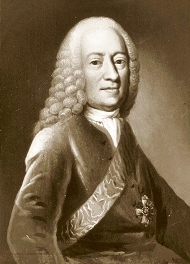Desmercières, Jean Henri
Born 8.5.1687 in Paris. Died 1778 in Copenhagen. Buried initially at the Reformist Church (both French and German) in Gothersgade, Copenhagen, and was later moved to Flemhude Church (BibLek III) (Janssen, 2014) Danish name: "Johan Henrik" Desmercières
Family
Father - Huguetan, Jean Henri, a book merchant and later bankier (Desmercières was an illegitimate child). The construction of his name Jean Henri came from his father's names, and the Desmercières allegedly came from his mistress who worked as a fashion designer in Rue des Merciers in Paris. His father did not deny his kinship with Desmercières, but he did not wish for his son to inherit his own huguenot surname (Janssen, 2014)
Mother: ?
Timeline
1720 - Given a position to learn the trade at his father's business enterprise in London (Janssen, 2014). After this time, Desmercières spent some time in Berlin as chamberlain to Frederik Wilhelm I (Janssen, 2014)
1727 - Konferensraad (BibLek III)
1732 - Owned 10.5% of all stocks of the Asiatisk Kompagni. (Rostgaard Nissen, 2002, p. 175)
1736 - His father provided Desmercières with a place as deputy in Kommercekollegiet in Denmark (BibLek III)
1741 - Owned 13.25% of all stocks of the Asiatisk Kompagni. (Rostgaard Nissen, 2002, p. 175)
1745 - Gehejmeraad with the title of excellency (BibLek III) (Janssen, 2014)
1736-1767 - Worked for Kommercekollegiet, including a brief period as president (i.e. minister of finance) (January to March 1767). He was given responsibiliy for the area of fishing, but had a keen interest in banking and the trading companies (BibLek III) (Janssen, 2014)
1747 - Owned 20 stocks in Vestindisk-Guineisk Kompagni. (Gøbel, 2015:67)
1751 - Established the connection for the marriage between Bernstorff and Buchwald, Charitas Emilie von from Holstein. (Janssen, 2014)
1751 - Married to Friis, Elisabeth Sophie of the old noble family, Friis. They never had any children, Desmercières was 64 years old at the time of their marriage (Janssen, 2014)
1751 - 19 february, a ball was held at the mansion at the corner of Bredgade and Dronningens Tværgade where "several high ministers (i.e. policians), cavaliers and ladies were splendidly entertained" (Kiøbenhavnske Danske Post-Tidender (1749-1762)) 1755 - Gehejmekonferensraad
1755 - Owned 5% of all stocks of the Asiatisk Kompagni. (Rostgaard Nissen, 2002, p. 175)
1755 - Partial in the establishment of the Afrikansk Kompagni
1766 - Listed as Præses at Afrikansk Kompagni. (Holck: Dannemarcks Handels=Speil 1766:56)
1766 - Director of Kurantbanken. (Holck: Dannemarcks Handels=Speil 1766:58)
1768 - Knight of the Order of the Elephant (BioLek III)
1776 - Enobled (BioLek III)
Property
Inherited a mansion in rococo-style on the corner of Bredgade and Dronningens Tværgade from his father, the so-called Plessenske Gård. (Aakjær et al, III, 1947, p. 66). This mansion remained the property of his wife, as in 1797 (around 4 april) she invited some children, including the son of the merchant Bech (i.e. the son was Bech, Marcus Christian, son of grosserer Bech, Jørgen) to see some theatre in the mansion (Bech 1910, 20)
1743-1764 - Owned the Emkendorf estate near Kiel, amongst others. Emkemdorf was a very large estate that comprised more than 5000 hectar of land (BibLek III) (Janssen, 2014). Reventlow, Ditlev (1712-?) purchased the estate from Desmercières in 1764 (Friis, 1903)
Partial in the establishment of Kurantbanken (BibLek III) (Janssen, 2014) His large inheritance at 440.688 Rigsdaler was left to a fideicommis to both his nieces, Marguerite de Monteleone, the Countess Knuth on Fyn and Anna de Monteleone, the princess Reuss in Schleswig Holstein (Janssen, 2014). In his testament, he had decided to grant 200.000 Rigsdaler to the Reformist Churches in Copenhagen and Fredericia (Janssen, 2014)
